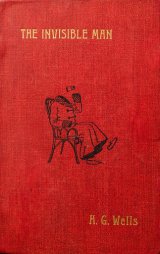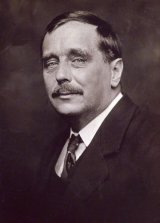The Invisible Man Page #4
The Invisible Man is a science fiction novel by H. G. Wells. Originally serialized in Pearson's Weekly in 1897, it was published as a novel the same year.
And he came down the steps towards the tail of the cart as if to lay hands on the smaller crate. No sooner had Fearenside's dog caught sight of him, however, than it began to bristle and growl savagely, and when he rushed down the steps it gave an undecided hop, and then sprang straight at his hand. "Whup!" cried Hall, jumping back, for he was no hero with dogs, and Fearenside howled, "Lie down!" and snatched his whip. They saw the dog's teeth had slipped the hand, heard a kick, saw the dog execute a flanking jump and get home on the stranger's leg, and heard the rip of his trousering. Then the finer end of Fearenside's whip reached his property, and the dog, yelping with dismay, retreated under the wheels of the waggon. It was all the business of a swift half-minute. No one spoke, everyone shouted. The stranger glanced swiftly at his torn glove and at his leg, made as if he would stoop to the latter, then turned and rushed swiftly up the steps into the inn. They heard him go headlong across the passage and up the uncarpeted stairs to his bedroom. "You brute, you!" said Fearenside, climbing off the waggon with his whip in his hand, while the dog watched him through the wheel. "Come here," said Fearenside--"You'd better." Hall had stood gaping. "He wuz bit," said Hall. "I'd better go and see to en," and he trotted after the stranger. He met Mrs. Hall in the passage. "Carrier's darg," he said "bit en." He went straight upstairs, and the stranger's door being ajar, he pushed it open and was entering without any ceremony, being of a naturally sympathetic turn of mind. The blind was down and the room dim. He caught a glimpse of a most singular thing, what seemed a handless arm waving towards him, and a face of three huge indeterminate spots on white, very like the face of a pale pansy. Then he was struck violently in the chest, hurled back, and the door slammed in his face and locked. It was so rapid that it gave him no time to observe. A waving of indecipherable shapes, a blow, and a concussion. There he stood on the dark little landing, wondering what it might be that he had seen. A couple of minutes after, he rejoined the little group that had formed outside the "Coach and Horses." There was Fearenside telling about it all over again for the second time; there was Mrs. Hall saying his dog didn't have no business to bite her guests; there was Huxter, the general dealer from over the road, interrogative; and Sandy Wadgers from the forge, judicial; besides women and children, all of them saying fatuities: "Wouldn't let en bite me, I knows"; "'Tasn't right have such dargs"; "Whad 'e bite 'n for, then?" and so forth. Mr. Hall, staring at them from the steps and listening, found it incredible that he had seen anything so very remarkable happen upstairs. Besides, his vocabulary was altogether too limited to express his impressions. "He don't want no help, he says," he said in answer to his wife's inquiry. "We'd better be a-takin' of his luggage in." "He ought to have it cauterised at once," said Mr. Huxter; "especially if it's at all inflamed." "I'd shoot en, that's what I'd do," said a lady in the group. Suddenly the dog began growling again. "Come along," cried an angry voice in the doorway, and there stood the muffled stranger with his collar turned up, and his hat-brim bent down. "The sooner you get those things in the better I'll be pleased." It is stated by an anonymous bystander that his trousers and gloves had been changed. "Was you hurt, sir?" said Fearenside. "I'm rare sorry the darg--" "Not a bit," said the stranger. "Never broke the skin. Hurry up with those things." He then swore to himself, so Mr. Hall asserts. Directly the first crate was, in accordance with his directions, carried into the parlour, the stranger flung himself upon it with extraordinary eagerness, and began to unpack it, scattering the straw with an utter disregard of Mrs. Hall's carpet. And from it he began to produce bottles--little fat bottles containing powders, small and slender bottles containing coloured and white fluids, fluted blue bottles labeled Poison, bottles with round bodies and slender necks, large green-glass bottles, large white-glass bottles, bottles with glass stoppers and frosted labels, bottles with fine corks, bottles with bungs, bottles with wooden caps, wine bottles, salad-oil bottles--putting them in rows on the chiffonnier, on the mantel, on the table under the window, round the floor, on the bookshelf--everywhere. The chemist's shop in Bramblehurst could not boast half so many. Quite a sight it was. Crate after crate yielded bottles, until all six were empty and the table high with straw; the only things that came out of these crates besides the bottles were a number of test-tubes and a carefully packed balance. And directly the crates were unpacked, the stranger went to the window and set to work, not troubling in the least about the litter of straw, the fire which had gone out, the box of books outside, nor for the trunks and other luggage that had gone upstairs. When Mrs. Hall took his dinner in to him, he was already so absorbed in his work, pouring little drops out of the bottles into test-tubes, that he did not hear her until she had swept away the bulk of the straw and put the tray on the table, with some little emphasis perhaps, seeing the state that the floor was in. Then he half turned his head and immediately turned it away again. But she saw he had removed his glasses; they were beside him on the table, and it seemed to her that his eye sockets were extraordinarily hollow. He put on his spectacles again, and then turned and faced her. She was about to complain of the straw on the floor when he anticipated her. "I wish you wouldn't come in without knocking," he said in the tone of abnormal exasperation that seemed so characteristic of him. "I knocked, but seemingly--" "Perhaps you did. But in my investigations--my really very urgent and necessary investigations--the slightest disturbance, the jar of a door--I must ask you--" "Certainly, sir. You can turn the lock if you're like that, you know. Any time." "A very good idea," said the stranger. "This stror, sir, if I might make so bold as to remark--"
Translation
Translate and read this book in other languages:
Select another language:
- - Select -
- 简体中文 (Chinese - Simplified)
- 繁體中文 (Chinese - Traditional)
- Español (Spanish)
- Esperanto (Esperanto)
- 日本語 (Japanese)
- Português (Portuguese)
- Deutsch (German)
- العربية (Arabic)
- Français (French)
- Русский (Russian)
- ಕನ್ನಡ (Kannada)
- 한국어 (Korean)
- עברית (Hebrew)
- Gaeilge (Irish)
- Українська (Ukrainian)
- اردو (Urdu)
- Magyar (Hungarian)
- मानक हिन्दी (Hindi)
- Indonesia (Indonesian)
- Italiano (Italian)
- தமிழ் (Tamil)
- Türkçe (Turkish)
- తెలుగు (Telugu)
- ภาษาไทย (Thai)
- Tiếng Việt (Vietnamese)
- Čeština (Czech)
- Polski (Polish)
- Bahasa Indonesia (Indonesian)
- Românește (Romanian)
- Nederlands (Dutch)
- Ελληνικά (Greek)
- Latinum (Latin)
- Svenska (Swedish)
- Dansk (Danish)
- Suomi (Finnish)
- فارسی (Persian)
- ייִדיש (Yiddish)
- հայերեն (Armenian)
- Norsk (Norwegian)
- English (English)
Citation
Use the citation below to add this book to your bibliography:
Style:MLAChicagoAPA
"The Invisible Man Books." Literature.com. STANDS4 LLC, 2025. Web. 4 Jan. 2025. <https://www.literature.com/book/the_invisible_man_138>.




Discuss this The Invisible Man book with the community:
Report Comment
We're doing our best to make sure our content is useful, accurate and safe.
If by any chance you spot an inappropriate comment while navigating through our website please use this form to let us know, and we'll take care of it shortly.
Attachment
You need to be logged in to favorite.
Log In